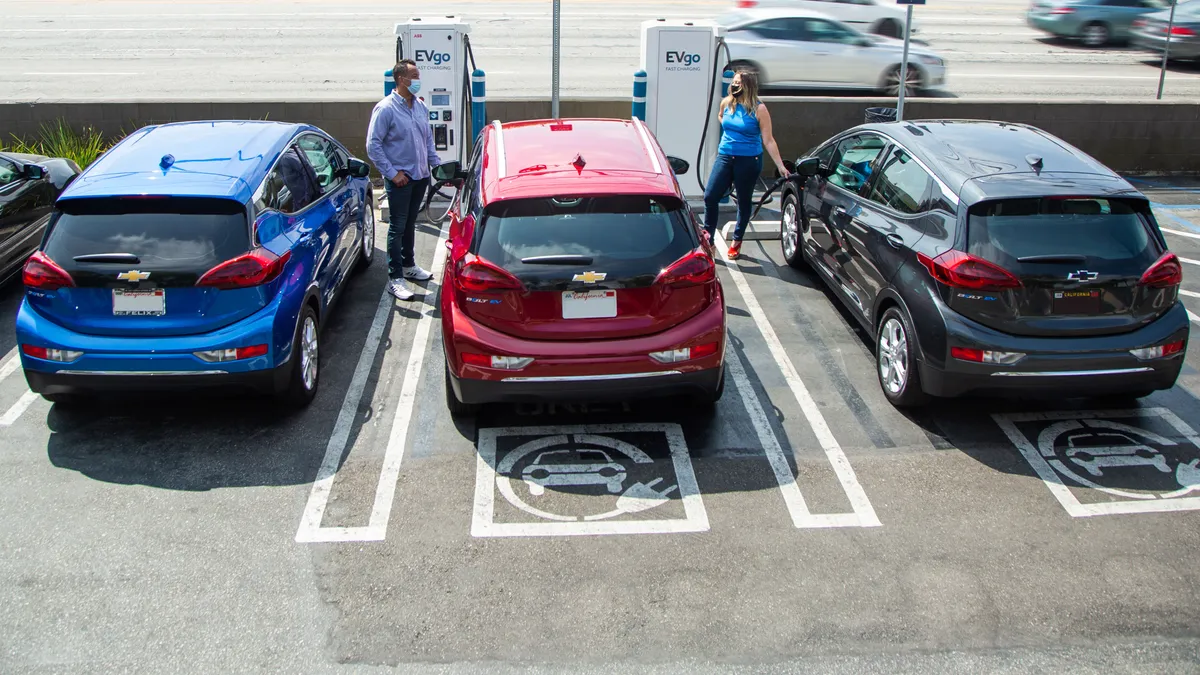Dive Brief:
- General Motors (GM) and EVgo, an electric vehicle (EV) charging station provider, announced Friday an effort to add 2,700 public fast charging stations in 40 metropolitan areas over the next five years, a move that would triple EVgo's existing charging network.
- The new charging stations will be prioritized in public areas like apartment buildings, retail spaces and other high-traffic locations, with intentions to also make them available for ride-hailing and delivery drivers. The charging stations will be located "where drivers will want to be," EVgo CEO Cathy Zoi said on a press call.
- Full terms of the partnership were not disclosed, though GM Chair and CEO Mary Barra said during the call that the company will invest cash and work with utilities and other stakeholders on siting the charging stations. Specific details on the 40 metropolitan areas will be released in the near future, Zoi said.
Dive Insight:
This initiative will represent a major expansion in EVgo's fast charging infrastructure, which Zoi said currently totals around 800 stations across 34 states, serving more than 200,000 customers. It also represents an advancement in the partnership between GM and EVgo, which first came together in 2018 when EVgo pledged to build an EV fast charging network for its now-shuttered Maven car-sharing service.
The announcement comes as EVs start to gain a stronger foothold in the automotive market, despite the new coronavirus pandemic (COVID-19), government reluctance to fully support the transition away from fossil fuels and sometimes anemic sales preventing even quicker adoption.
Range anxiety has "fallen to the background" for many consumers as the batteries and charging technology for EVs have evolved rapidly, but those who want to transition to an EV are demanding more charging infrastructure to address any lingering concerns, Barra said.
Barra and Zoi acknowledged there is more work to be done to fully support the transition from fossil fuel-reliant cars to EVs. Zoi said there will likely need to be upwards of 50,000 public fast chargers nationwide, in addition to private chargers in people's homes. She said while this investment may look like a drop in the ocean, it is a "significant step in that direction."
"We thought the partnership with EVgo provides a great opportunity to accelerate that robust charging network, which will support customers as they convert to EV vehicles," Barra added.
EV charging infrastructure has been at the forefront of discussions around the future of America’s infrastructure, especially as elected leaders look to stimulate the economy post-coronavirus. In June, leading House Democrats unveiled the Investing in a New Vision for the Environment and Surface Transportation in America (INVEST in America) Act, which included a ramp-up of charging infrastructure investments in a bid to accelerate EV adoption.
Zoi has been critical in the past of proposals to end the federal tax credit for EV purchases, and said on the call last week there need to be real incentives for people to buy EVs and for infrastructure to be installed.
"Chicken and egg has often been the metaphor that's been used with EVs and infrastructure," Zoi said. "We like to think of it more as a peanut butter and jelly. Incentives for stimulating the purchases of EVs, that's the peanut butter, and the jelly is stimulus to get the infrastructure out there quickly so that people feel comfortable purchasing a car that they can charge where they live, where they work, where they shop."












